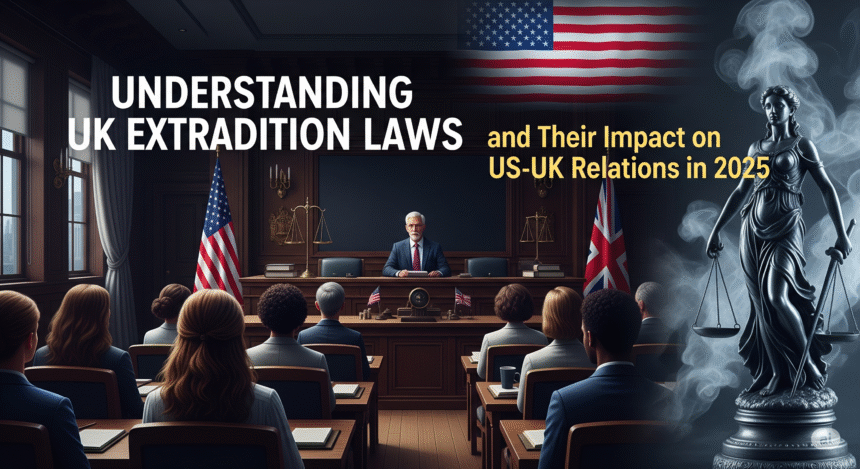Extradition in a Changing Global Landscape
UK Extradition Laws : Extradition is a critical pillar in international criminal law, facilitating the transfer of individuals from one jurisdiction to another for the purpose of prosecution or punishment. In 2025, as geopolitical alliances and international agreements evolve, UK extradition laws and their connection to US–UK relations are more relevant than ever. With high-profile cases drawing media attention and human rights considerations playing a larger role, understanding the UK extradition process 2025 is essential for legal professionals, policymakers, and the general public.
This comprehensive guide explores the UK–US extradition treaty, the Extradition Act 2003 UK, and the impact of landmark cases like Soering v UK extradition. We’ll also delve into controversial topics such as double criminality, political offence exceptions, and ECHR Article 3.
READ MORE :- Top Tech Trends to Watch in the USA for 2025
The Framework: Extradition Act 2003 UK
The foundation of UK extradition law lies in the Extradition Act 2003 UK, which consolidated and modernised earlier legislation. This Act:
- Divides extradition requests into Category 1 (EU countries) and Category 2 (non-EU, including the US).
- Outlines legal criteria such as dual criminality, human rights protections, and proportionality.
- Sets strict timetables for arrest, hearing, and appeal.
Since Brexit, the UK has revised its approach, and while the US remains a Category 2 country, new procedures are continually evolving in 2025.
UK–US Extradition Treaty: Key Provisions
The UK–US extradition treaty signed in 2003 has been controversial due to claims of imbalance. Key features include:
- No need for prima facie evidence from the US.
- Broad definitions of extraditable offences.
- Limits on extradition for political offences (though the scope is narrow).
Critics argue this treaty heavily favours the US, while proponents cite its efficiency and role in counter-terrorism.
UK Extradition Process in 2025: Step-by-Step
The UK extradition process in 2025 typically includes the following stages:
- Request Received: The Home Office receives an extradition request.
- Arrest & Court Hearing: The individual is arrested and brought before a magistrate.
- Judicial Consideration: The judge considers:
- Whether the offence is extraditable
- Double criminality
- Human rights protections
- Political offence exception
- Home Secretary Decision: If the judge approves, the case is passed to the Home Secretary for final decision.
Legal safeguards are integrated, but critics highlight gaps in transparency and fairness
Double Criminality in UK-US Extradition
The principle of double criminality extradition UK-US requires that the conduct alleged be a crime in both jurisdictions. While this is a key safeguard, it has:
- Been weakened in practice by broad categorisation of crimes.
- Led to controversial extraditions for actions not prosecuted in the UK.
- Been challenged in Parliament and courts over human rights implications.
Human Rights & Extradition: The ECHR Framework
A growing concern in extradition cases is human rights extradition UK. Under the European Convention on Human Rights (ECHR), Article 3 prohibits extradition if it leads to:
- Torture
- Inhuman or degrading treatment
- Unjust trial conditions
Soering v UK Extradition: A Landmark Case
In this pivotal 1989 case, the European Court ruled that extraditing Jens Soering to the US would violate ECHR Article 3 UK due to the risk of prolonged death row detention. This case set the precedent for:
- Assessing conditions in receiving states.
- Blocking extradition on human rights grounds.
It remains one of the most cited decisions in UK extradition law.
The Political Offence Exception
The political offence exception UK extradition is a controversial doctrine that can bar extradition for crimes of a political nature. However:
- It has been narrowly interpreted in recent years.
- Excludes terrorism and violent acts.
- Remains a hotly debated concept in high-profile cases.
Legal scholars argue it must evolve to better protect individuals targeted for political dissent.
Practical Implications for US-UK Legal Cooperation
The practical implications US UK extradition cooperation include:
- Increased pressure on the UK to comply with US requests.
- Diplomatic tensions in cases involving political sensitivities.
- Rising public and media scrutiny.
Some legal experts call for reform to rebalance fairness in the treaty, while maintaining strong transatlantic justice cooperation.
Impact on US–UK Relations
The impact US–UK relations extradition laws has been significant:
- Positive: Enhanced security collaboration, anti-terror measures.
- Negative: Perceptions of inequality, especially in corporate and cybercrime cases.
- Complex: Balancing sovereignty with shared legal values.
Brexit has further complicated matters, as the UK seeks to renegotiate treaties and redefine its global role.
Notable Extradition Cases (2003–2025)
- Gary McKinnon: UK hacker whose extradition to the US was blocked on mental health and human rights grounds.
- Julian Assange: Ongoing case, central to debates on press freedom, political offences, and prison conditions.
- Anne Sacoolas: US citizen involved in a road incident leading to extradition controversy.
Each case has reshaped public opinion and legal norms.
Conclusion: A Legal Crossroads
In 2025, the intersection of UK extradition laws, human rights obligations, and UK-US legal treaty extradition frameworks presents a complex legal and moral landscape. While the legal architecture has evolved since the Extradition Act 2003 UK, core issues such as double criminality, ECHR Article 3, and the political offence exception continue to spark debate.
Legal reformers, policymakers, and citizens must stay vigilant in ensuring that justice is balanced with fairness and that extradition does not become a tool of political persecution.














